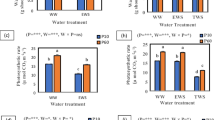Abstract
Trigonelline (TRG) is a conjugate of nicotinic acid, and is postulated to function as a compatible solute in response to salinity- and water deficit-stresses. TRG concentrations and several agronomic characteristics were measured under irrigated field and non-irrigated field conditions within 18 soybean (Glycine max) genotypes using leaves taken from different growth stages (vegetative, flowering and pod development). Under irrigation, relative water content (RWC) ranged from 90.0 to 99.6 %. Under non-irrigation, RWC ranged from 86.3 to 97.5 %. TRG concentration ranged from 364 to 555 μg g−1(d.m.) under irrigation, and from 404 to 570 μg g−1(d.m.) under non-irrigation. TRG concentrations increased in the majority of genotypes (15 of 18) under non-irrigation even though RWC did not significantly differ in many genotypes between treatments. TRG decreased as plants progressed to pod development and seed filling. Mean seed yield under non-irrigated conditions declined 55 % relative to the irrigated controls. TRG concentrations among all genotypes were significantly correlated with seed yield.
Similar content being viewed by others
References
Breitkreuz, K.E., Shelp, B.J., Rentsch, D.: Identification and characterization of GABA, proline and quaternary ammonium compound transporters from Arabidopsis thaliana.-FEBS Lett. 450: 280–284, 1999.
Cho, Y., Lightfoot, D.A., Wood, A.J.: Trigonelline concentrations in salt stressed leaves of cultivated Glycine max.-Phytochemistry 52: 1235–1238, 1999.
Cho, Y., Chen, X., Wood, A.J.: Crop improvement by genetic engineering: Enhancing abiotic stress-tolerance using the compatible solutes glycinebetaine and trigonelline.-Res. adv. Phytochem. 2: 109–122, 2001.
Evans, L.S., Tramontano, W.A.: Is trigonelline a plant hormone?-Amer. J. Bot. 68: 1282–1289, 1981.
Evans, L.S., Tramontano, W.A.: Trigonelline and promotion of cell arrest in G2 of various legumes.-Phytochemistry 23: 1837–1840, 1984.
Evans, L.S., Tramontano, W.A., O'Connor, R.F., Gill, R., Ciancaglini, E.: Metabolism of nicotinic acid and nicotinamide in cultured and seedling roots of Pisum sativum in relation to promotion of cell arrest in G2 by trigonelline.-Environ. exp. Bot. 24: 283–292, 1984.
Lynn, D.G., Lewis, D.H., Tramontano, W.A., Evans, L.S.: Induction of cell arrest in G2: structural specificity of trigonelline Pisum sativum.-Phytochemistry 23: 1225–1228, 1984.
Mazzuca, S., Bitonti, M.B., Innocenti, A.M., Francis, D.: Inactivation of DNA replication origins by the cell cycle regulator, trigonelline, in root meristems of Lactuca sativa.-Planta 211: 127–132, 2000.
Njiti, V.N., Doubler, T.W., Suttner, R.J., Gray, L.E., Gibson, P.T., Lightfoot, D.A.: Resistance to soybean sudden death syndrome and root colonization by Fusarium solani f. sp. glycine in near isogenic lines.-Crop Sci. 38: 472–477, 1998.
Nuccio, M.L., Rhodes, D., McNeil, S.D., Hanson, A.D.: Metabolic engineering of plants for osmotic stress resistance.-Curr. Opinion Plant Biol. 2: 128–134, 1999.
Pfeiffer, T.L., Cho, Y., Gibson, D., Young, B., Wood A.J.: Utility of trigonelline as a biochemical marker for interspecific competition between soybean and the weed common waterhemp.-Biol. Plant. 44: 619–622, 2001.
Phillips, D.A., Wery, J., Joseph, C.M., Jones, A.D., Teuber, L.R.: Release of flavonoids and betaines from seeds of seven Medicago species.-Crop Sci. 35: 805–808, 1995.
Sakamoto, A., Murata, N.: Genetic engineering of glycinebetaine synthesis in plants: current status and implications for enhancement of stress tolerance.-J. exp. Bot. 51: 81–88, 2000.
Shomer-Ilan, A., Jones, G.P., Paleg, L.G.: In vitro thermal and salt stability of pyruvate kinase are increased by proline analogues and trigonelline.-Aust. J. Plant Physiol. 18: 279–286, 1991.
Starr, G.C., Lowery, B., Cooley, E.T., Hart, C.L.: Soil water content determination using network analyzer reflectometry methods.-Soil Sci. Soc. Amer. J. 63: 285–289, 1999.
Tramontano, W.A., Jouve, D.: Trigonelline accumulation in salt-stressed legumes and the role of other osmoregulators as cell cycle control agents.-Phytochemistry 44: 1037–1040, 1997.
Tramontano, W.A., Evans, L.S., McGinley, P.A.: Effects of cytokinins on promotion of cell arrest in G2 by trigonelline and trigonelline concentrations in cultured roots of Pisum sativum and Glycine max.-Environ. exp. Bot. 25: 83–88, 1985.
Tramontano, W.A., Hartnett, C.M., Lynn, D.G., Evans, L.S.: Relationship between trigonelline concentration and promotion of cell anest in G2 trigonelline in cultured roots of Pisum sativum.-Phytochemistry 21: 1201–1206, 1982.
Tramontano, W.A., Lynn, D.G., Evans, L.S.: Nicotinic acid and nicotinamide metabolism and promotion of cell arrest in G2 in Pisum sativum.-Phytochemistry 22: 343–346, 1983.
Tramontano, W.A., McGinley, P.A., Ciancaglini, E.F., Evans, L.S.: A survey of trigonelline concentrations in dry seeds of the dicotyledoneae.-Environ. exp. Bot. 26: 197–205, 1986.
Wood, A.J.: Comparison of salt-induced osmotic adjustment and trigonelline accumulation in two soybean cultivars.-Biol. Plant. 42: 389–394, 1999.
Wood, A.J., Saneoka, H., Joly, R.J., Rhodes, D., Goldsbrough, P.B.: Betaine aldehyde dehydrogenase in Sorghum bicolor: molecular cloning and expression of two related genes.-Plant Physiol. 110: 1301–1308, 1996.
Wood, A.J., Cho, Y., Chen, X.: Trigonelline (nicotinic acid betaine) biosynthesis in plants: NaCl-& drought-stress induced accumulation in cultivated Glycine max.-In: Pandalai, S.G. (ed.): Recent Research Developments in Phytochemistry. Vol. 4. Pp. 89–98. Research Signpost, Kerala 2000.
Yoshiba, Y., Kiyosue, T., Nakashima, K., Yamaguchi-Shinozaki, K., Shinozaki, K.: Regulation of levels of proline as an osmolyte in plants under water stress.-Plant Cell Physiol. 38: 1095–1102, 1997.
Yuyama, S., Suzuki, T.: Isolation and identification of Nl-methynicotinic acid (trigonelline) from rat urine.-J. Nutr. Sci. Vitaminol. 31: 157–167, 1985.
Author information
Authors and Affiliations
Rights and permissions
About this article
Cite this article
Cho, Y., Njiti, V., Chen, X. et al. Trigonelline Concentration in Field-Grown Soybean in Response to Irrigation. Biologia Plantarum 46, 405–410 (2003). https://doi.org/10.1023/A:1024390522259
Issue Date:
DOI: https://doi.org/10.1023/A:1024390522259




